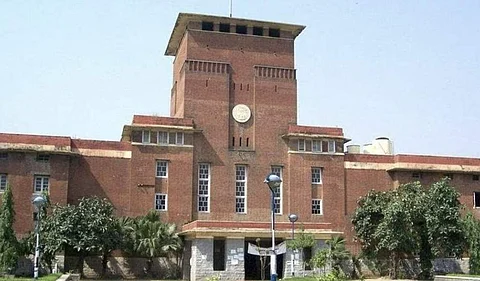

The recent introduction of the Five-Year Integrated Law Courses starting from the academic year 2023-2024 at Delhi University (DU) has sparked a wave of outrage among the student community. The All India Students' Association (AISA) had initially organised a protest scheduled for August 17 at 3 pm near the CLC gate. However, the protest has been temporarily postponed. “The protest was originally planned in response to the new fee structure. Yet, as events unfolded, it became evident that the concerns extended far beyond just the fee arrangement,” claims Manik Gupta, a student pursuing LLB at DU's Law Faculty, as he highlights the discontent regarding issues like infrastructure, curriculum, syllabus and various other aspects.
The Five-Year Integrated Law Courses includes BA LLB (Honours) and BBA LLB (Honours) and were officially announced in a notice issued by the DU Faculty of Law dated August 4. The notice also states that each of these courses will accommodate 60 students, with admissions being determined based on the Common Law Admission Test (CLAT) UG 2023 results. The classes for this course will be held at the Faculty of Law, Kanad Bhawan, North Campus, DU. The online application process for the courses is expected to be disclosed shortly. As students eagerly await this announcement, there is an impending intention to escalate their agitation against the introduction of these courses.
In their call for protest statement, the AISA explicitly expresses, “DU, known for its claim of inclusivity and accessibility, is now shamelessly robbing students with a Rs. 1,90,000 fee for the 5-year integrated LLB program. This is NOT what we signed up for!” Demanding an immediate cessation of arbitrary fee hikes, AISA condemns this as an act of “robbery” of education and affordable learning.
Manik, who perceives this course more as a "money-making scheme" rather than an "educational scheme", states, “Despite the substantial fee structure of around Rs 1,90,000, there exists an absence of a well-defined syllabus, curriculum, or adequate infrastructure at DU for this programme. Is this fair for the students? Additionally, how can we deem this as inclusive? How can students from marginalised backgrounds realistically bear such expenses?”
In contrast to the present scenario, the Faculty of Law at DU offered three-year LLB and LLM courses and levied a minimal fee ranging from Rs. 5,000 to Rs. 7,000 per year. This department has contributed significantly to the realm of law by nurturing individuals of eminence like the current Chief Justice of India (CJI), DY Chandrachud and former CJI Madan Mohan Punchhi, among others.
“Law studies inherently cater to a privileged demographic and even the CLAT exam carries a cost of Rs 5,000. DU used to be the solitary esteemed law faculty that was within reach for all aspiring law students. How can a less privileged student even fathom pursuing legal education under these circumstances?” claims Manik.
Furthermore, it's worth noting that in the past, admission to the DU Faculty of Law was determined by the Delhi University Entrance Test (DUET) examination. However, according to Manik, a pivotal change has been introduced this year, with the department adopting the Common University Entrance Test (CUET) for admissions. “The admission will only be based on the general paper of CUET as there is no specialised paper for law admission. This means that a candidate pursuing African studies, for instance, will sit for the exact same exam as someone aiming for a law degree. This strikes me as utterly ridiculous,” alleges Manik in exasperation.
As the ongoing protest against the escalated fees and the introduction of new courses at DU persists, it's intriguing to observe that a similar pattern of allegations has emerged concerning many of the new courses introduced at DU and other esteemed central government universities, such as Jawaharlal Nehru University (JNU). These allegations include inadequacies in infrastructure and flawed implementation juxtaposed with exorbitant fee structures. This divergence from the historical norms of these institutions is palpable. Notably, JNU's MBA programme had encountered comparable upheavals last year, and the underlying issues continue to linger without resolution.
